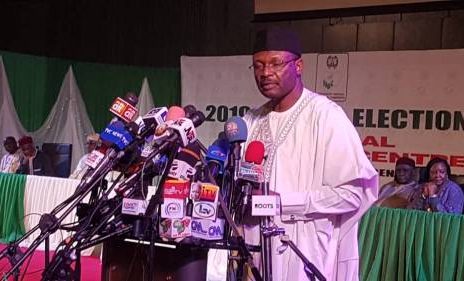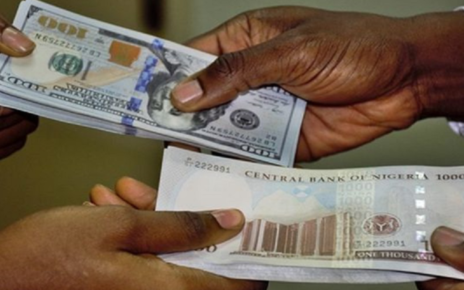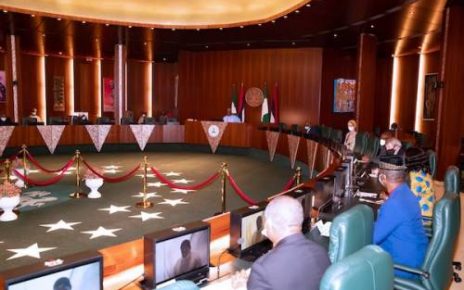The Independent National Electoral Commission (INEC) crowned President Buhari winner of the February 23 election with 15,191,847 of the total votes cast while Atiku gained 11,262,978 votes.
However, in a petition filed before the Presidential Election Petitions Tribunal last month, Atiku claimed that he actually won the election with 1.6 million more votes than Buhari according to an internal compilation of results he claimed was obtained from INEC’s server.
While filing its response before the tribunal on Thursday, April 11, INEC accused Atiku and the PDP of producing fake election results to prove his case.
“INEC specifically denies the existence of electronic transmission of results and it is unknown to the Electoral Act 2010 (as amended),” the commission noted in its response.
According to the result announced by INEC, 76-year-old Buhari won re-election for a second term
In response to INEC’s new position, Atiku and the PDP have filed a fresh response revealing that they’ll will call upon Microsoft, IBM and Oracle experts to prove the claim that the result obtained from the INEC server is the true result of the presidential election.
“The servers from which the said figures were derived belong to the 1st respondent (INEC). The figures and votes were transmitted to the 1st respondent’s Presidential result’s server 1 and thereafter aggregated in INEC_PRES_RSLT_SRV2019 whose physical address or unique Mac address as 94-57-A5-DC-64-B9 with Microsoft Product ID 00252-70000-0000-AA535. The descriptions are unique to the 1st respondent’s server.
“The petitioners will at the trial of this petition rely on experts on Microsoft, IBM and Oracle, amongst others,” Atiku’s response read.
The petitioners’ legal team also says it’ll tender INEC’s training manual on elections, a printout of the votes of candidates from smart card readers and a printout of the forensic audit report on INEC’s server as evidence.
Atiku and the PDP also accused INEC Chairman, Mahmood Yakubu, of committing grave errors in the final collation of results for the presidential election as he wrongly attributed four candidates with the wrong scores and political parties.
According to the result obtained from the INEC server as claimed by Atiku in his petition, the former vice-president actually scored 18,356,732 votes while Buhari scored 16,741,430 votes. 71 other candidates participated in the election.
The Independent National Electoral Commission (INEC) crowned President Buhari winner of the February 23 election with 15,191,847 of the total votes cast while Atiku gained 11,262,978 votes.
However, in a petition filed before the Presidential Election Petitions Tribunal last month, Atiku claimed that he actually won the election with 1.6 million more votes than Buhari according to an internal compilation of results he claimed was obtained from INEC’s server.
While filing its response before the tribunal on Thursday, April 11, INEC accused Atiku and the PDP of producing fake election results to prove his case.
“INEC specifically denies the existence of electronic transmission of results and it is unknown to the Electoral Act 2010 (as amended),” the commission noted in its response.
According to the result announced by INEC, 76-year-old Buhari won re-election for a second term
In response to INEC’s new position, Atiku and the PDP have filed a fresh response revealing that they’ll will call upon Microsoft, IBM and Oracle experts to prove the claim that the result obtained from the INEC server is the true result of the presidential election.
“The servers from which the said figures were derived belong to the 1st respondent (INEC). The figures and votes were transmitted to the 1st respondent’s Presidential result’s server 1 and thereafter aggregated in INEC_PRES_RSLT_SRV2019 whose physical address or unique Mac address as 94-57-A5-DC-64-B9 with Microsoft Product ID 00252-70000-0000-AA535. The descriptions are unique to the 1st respondent’s server.
“The petitioners will at the trial of this petition rely on experts on Microsoft, IBM and Oracle, amongst others,” Atiku’s response read.
The petitioners’ legal team also says it’ll tender INEC’s training manual on elections, a printout of the votes of candidates from smart card readers and a printout of the forensic audit report on INEC’s server as evidence.
Atiku and the PDP also accused INEC Chairman, Mahmood Yakubu, of committing grave errors in the final collation of results for the presidential election as he wrongly attributed four candidates with the wrong scores and political parties.
According to the result obtained from the INEC server as claimed by Atiku in his petition, the former vice-president actually scored 18,356,732 votes while Buhari scored 16,741,430 votes. 71 other candidates participated in the election.
The Independent National Electoral Commission (INEC) crowned President Buhari winner of the February 23 election with 15,191,847 of the total votes cast while Atiku gained 11,262,978 votes.
However, in a petition filed before the Presidential Election Petitions Tribunal last month, Atiku claimed that he actually won the election with 1.6 million more votes than Buhari according to an internal compilation of results he claimed was obtained from INEC’s server.
While filing its response before the tribunal on Thursday, April 11, INEC accused Atiku and the PDP of producing fake election results to prove his case.
“INEC specifically denies the existence of electronic transmission of results and it is unknown to the Electoral Act 2010 (as amended),” the commission noted in its response.
According to the result announced by INEC, 76-year-old Buhari won re-election for a second term
In response to INEC’s new position, Atiku and the PDP have filed a fresh response revealing that they’ll will call upon Microsoft, IBM and Oracle experts to prove the claim that the result obtained from the INEC server is the true result of the presidential election.
“The servers from which the said figures were derived belong to the 1st respondent (INEC). The figures and votes were transmitted to the 1st respondent’s Presidential result’s server 1 and thereafter aggregated in INEC_PRES_RSLT_SRV2019 whose physical address or unique Mac address as 94-57-A5-DC-64-B9 with Microsoft Product ID 00252-70000-0000-AA535. The descriptions are unique to the 1st respondent’s server.
“The petitioners will at the trial of this petition rely on experts on Microsoft, IBM and Oracle, amongst others,” Atiku’s response read.
The petitioners’ legal team also says it’ll tender INEC’s training manual on elections, a printout of the votes of candidates from smart card readers and a printout of the forensic audit report on INEC’s server as evidence.
Atiku and the PDP also accused INEC Chairman, Mahmood Yakubu, of committing grave errors in the final collation of results for the presidential election as he wrongly attributed four candidates with the wrong scores and political parties.
According to the result obtained from the INEC server as claimed by Atiku in his petition, the former vice-president actually scored 18,356,732 votes while Buhari scored 16,741,430 votes. 71 other candidates participated in the election.

![Atiku Abubakar believes he won the 2019 presidential election [AFP]](https://naijanewsportal.com/wp-content/uploads/2019/04/Atiku-Abubakar-believes-he-won-the-2019-presidential-election-AFP.jpg)


